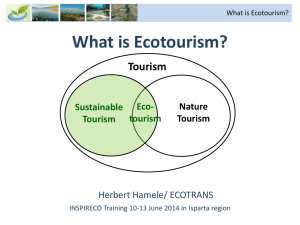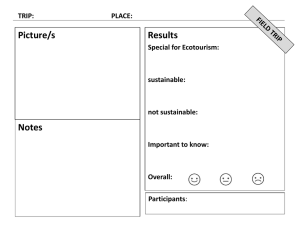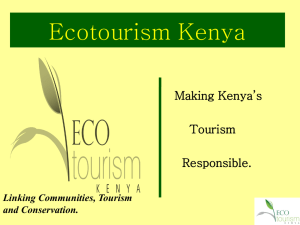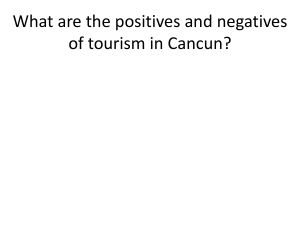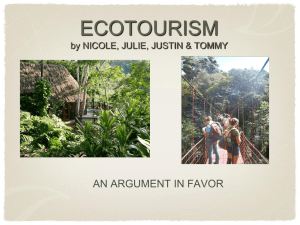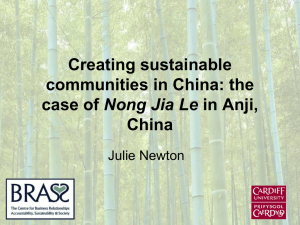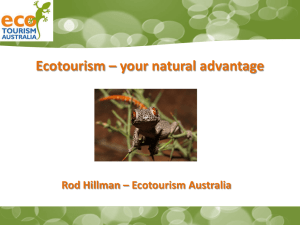Unleashing the potential of ecotourism in Malaysia
advertisement
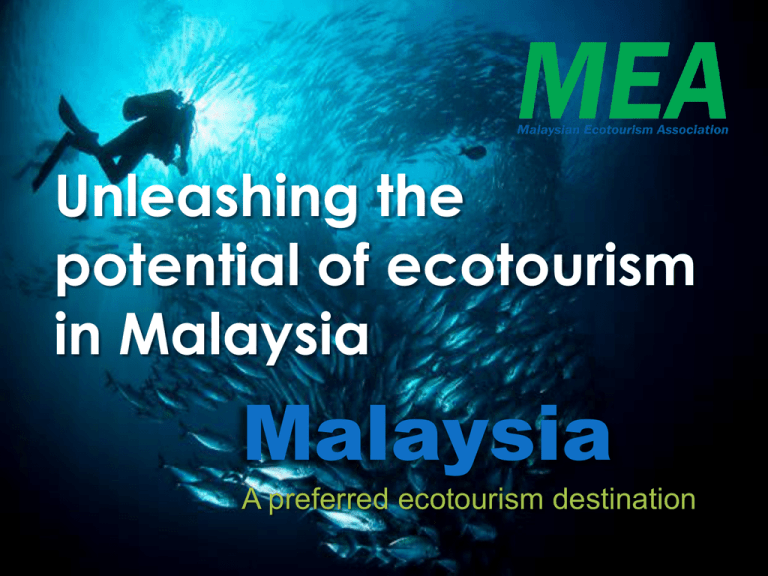
Unleashing the potential of ecotourism in Malaysia Malaysia A preferred ecotourism destination Unleashing the potential of ecotourism in Malaysia What is Ecotourism? Ecotourism Development in Malaysia Does Malaysia have the potential for Ecotourism Development? What Are The Challenges Ahead? Enhancing the value of Ecotourism In Malaysia The Role of the Malaysian Ecotourism Association (MEA) What is ecotourism? Types of nature based tourism Adventure Tourism Nature Tourism/ Wildlife Tourism Ecotourism Tourism “in” the environment Tourism “about” the environment , flora & fauna Tourism “for” the environment , flora, fauna & communities Definition of ecotourism The World Conservation Union describes ecotourism as “environmentally responsible travel and visitation to natural areas, in order to enjoy and appreciate nature and for any accompanying cultural features that promote conservation, have a low visitor impact and provide for beneficially active socio-economic involvement of local people”. The power of ecotourism The power of ecotourism: “The ability and capacity to conserve life and nature in relatively undisturbed natural areas while enriching the lives of rural communities through responsible and sustainable tourism” Obligations of Eco-Operators ENGAGING COMMUNITY OBLIGATIONS Sustainable Development Obligations of Eco-tourists ECOLOGICAL CONSERVATION OBLIGATIONS Responsible Travel Core Principles of Ecotourism ECOLOGICAL & COMMUNITY OBLIGATIONS TOURISM Sustainable & Responsible Protected Areas in Malaysia 60% of Malaysia’s total land area is under forest cover. Malaysia is one of the world’s megadiverse countries. The other 2 in South East Asia is Indonesia and Philippines The flora of Malaysia - about 15,000 species of higher plants. Ferns - over 1,100 many of which are endemic. Vertebrates - 300 species of wild mammals, 700 to 750 birds, 350 reptiles, 165 amphibians and more than 300 freshwater fishes. Invertebrates - more than 100,000 species. Forested protected land - more than 5,000,000 hectares (equivalent to 7 times the size of Singapore) which covers watershed protected areas, wildlife sanctuary, and Protected Areas in Malaysia 23 terrestrial National and State Parks encompassing more than 850,000 hectares. 136 marine protected areas, 40 islands has been gazetted as marine parks. Totally protected forest areas - 15.3% of its land area. Sectoral policies and laws governing biodiversity, such as - National Forestry Policy, - National Environment Policy, - 3rd National Agriculture Policy, -National Wetlands Policy, -Forestry Act 1984, Wildlife -Protection Act 1972 and 2010, -National Park Act 1980 and Fishery Act 1985. National Parks & Ecotourism Sites (Department of Wildlife & National Parks) Taman Negara Pahang National Park Taman Negara Terengganu National Park Taman Negara Kelantan National Park Taman Negara Pulau Pinang National Park Tasek Bera Ramsar Site National Elephant Conservation Centre, Kuala Gandah, Pahang Malacca Zoo Gunung Benum Wildlife Conservation Centre (River Terrapin), Bota Kanan, Perak Paya Indah Wetlands, Dengkil, Selangor Ecotourism destinations Pahang Taman Negara National Park, Kuala Gandah Elephant Sanctuary Kenong Rimba Park Selangor Sungai Chilling Waterfall, Kuala Selangor Perak Royal Belum Forest Reserve Gua Tempurung, Perak Kuala Gula Bird Sanctuary Penang National Heritage Park Kedah Kilim Geopark, Langkawi Terengganu Rantau Abang Turtle Hatchery Redang Island Perhentian Island Gemia Island. Sarawak • • • • • Sabah • • • • • • • • • Bako National Park Mulu National Park Niah National Park Batang Ai National Park Lampir Hill National Park Sepilok Orang Utan Sanctuary Kinabalu National Park Tunku Abdul Rahman National Park Danum Valley Maliau Basin Tabin Wildlife Reserve Kinabatangan Floodplain, Sukau Turtle Island Gua Gomantong, Kinabatangan NATIONAL ECOTOURISM PLAN 1996 The National Ecotourism Plan will include the following elements of implementation: (a) adopt and promote a clear definition of ecotourism; (b) adopt and promote a clear policy on developing ecotourism; (c) strengthen the Eco and AgroTourism Implementation Committee; (d) implement legal changes to support implementation of the Plan; and (e) establish a monitoring and evaluation programme. NATIONAL ECOTOURISM PLAN 1996 45 of the 60 eco-tourism areas approved under the Eighth and Ninth Malaysia Plans, were not "potential areas" as identified under the National Eco-Tourism Plan. Implementation of ecotourism projects under the Eighth Malaysia Plan was "less than satisfactory" with only half of the 20 projects completed National Ecotourism Plan 1996 still yet to be reevaluated to-date Newspaper report in 2008 Malaysia’s ecotourism potential Needs of eco-tourists Environmental & Cultural Sustainability Quality of Experience Depending on the type of tourist Accessibility & Weather Safety and Health Malaysia’s ecotourism potential Needs of eco-tourists Safety and Health 1) Safe compared to other countries 2) Mobile connectivity is good 3) Health and safety regulations 4) Sheltered from natural adversities 5) Many rural areas have basic utilities and amenities Malaysia’s ecotourism potential Needs of eco-tourists Accessibility & Weather 1) Paved road network throughout 2) Public bus transport available in rural areas Malaysia’s ecotourism potential Needs of eco-tourists Quality of Experience Depending on the type of tourist 1) English is widely spoken in rural areas 2) Malaysia’s national & state parks are better managed 3) Malaysia is one of 3 countries in South East Asia are considered mega bio-diverse and among 17 in the world Malaysia’s ecotourism potential Needs of eco-tourists Environmental & Cultural Sustainability Establishment of the Malaysia Mega Biodiversity Hub - Joint ministerial effort between Ministry of Tourism and Ministry of National Resources and Environment Establishment of Malaysian Ecotourism Association - Collaborative alliance between business sector, academic institutions and professionals What are the challenges ahead? MANAGEMENT Lack of a workable National Ecotourism Plan that is business oriented Need to identify ecotourism sites DEVELOPMENT Incorporation of cultural sustainability into ecotourism BUSINESS Demand and supply issues High risks – inclement weather, climate change, natural adversities Communication difficulty Low price syndrome and low profit margins STAKEHOLDERS Lack of awareness and understanding of ecotourism by stakeholders Lack of training and communication skills of stakeholders FUNDING Lack of government funds and infrastructure LEGAL MATTERS Remoteness and unclear boundaries of protected areas Lack of enforcement either due to lack of manpower or funding FLOOR VOTING Initiatives for National Parks a) Should it be mandatory that all national and state parks to print and distribute nature interpretative materials in the form of park notes and guides to enhance visitors’ ecotourism experience? Yes No b) Should National and State Parks in Malaysia be re-designated as National or State Conservation Parks instead, to shift the mindset of the public towards conservation and mandatory Conservation Fees be collected from visitors/tourists as a step towards sustainable tourism? Yes No c) Should National and State Parks offer conservation programmes and activities for volunteer ecotourism similar to Sepilok Orang Utan Sanctuary and Turtle Conservation Centre? Yes No d) Interpretative centres act as an additional attraction to enhance the value of ecotourism experience. Should it be mandatory for all naturebased tourism sites to have interpretative centres? Yes No FLOOR VOTING Initiatives for Marketing a) Do you think Internet technology and social media are the best marketing channels for ecotourism? Yes No b) Should nature/environmental conservation programmes and activities be marketed as ecotourism activities? Yes No c) Should ecotourism packages also include community based cultural attractions and activities for example homestay, local customs and traditions as well as local cuisine to expand and enhance the attractiveness of ecotourism? Yes No d) Should Ministry of Tourism and Tourism Malaysia shift their tourism and market development policies on ecotourism to high value luxury investments in rural areas promoting privacy and comfort, and targeting at tourist market segments with eco-centric profiles? Yes No Join the Malaysian Ecotourism Association Concerned > Communicate > Collaborate > Cooperate > Connect > Contribute Role of Malaysian Ecotourism Association Affirmative public-private-people partnership Industry members support & networking Information resources and knowledge base MEMBERS’ ACTIVITIES 1. Marketing & Networking 2. Product Development 3. Capacity Building 4. Associations/ Cooperatives Set-ups 5. Government Funding 6. Leadership Nurturing 7. E-Business Malaysian Ecotourism Association Activities ASSOCIATION ACTIVITIES 1. MEA Seminar on Ecotourism for MOTOUR and NRE(2009) 2. World Ecotourism Conference 2010 3. Revitalisation of Rural Resources through Sustainable Tourism funded by MOF (MIDA) Kuala Lumpur –East Coast Ecotourism Corridor (KL-ECEC) A Malaysian Ecotourism Association Initiative An affiliate member of Urban Ecotourism & Biodiversity Hotspots in Developing Countries - Sustainability - Marketability - Resource Capacity - Business Practicability Founder Organisation of the Asia Pacific Ecotourism Society Supporting Organisation of World Ecotourism Conference www.EcotourismMalaysia.org Nominated Board Member of Malaysia Mega-Biodiversity Hub Thank You!
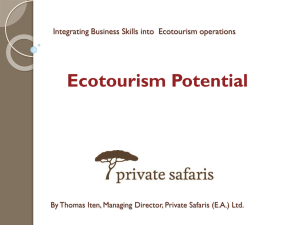
![Ecotourism_revision[1]](http://s2.studylib.net/store/data/005398532_1-116d224f2d342440647524cbb34c0a0a-300x300.png)
